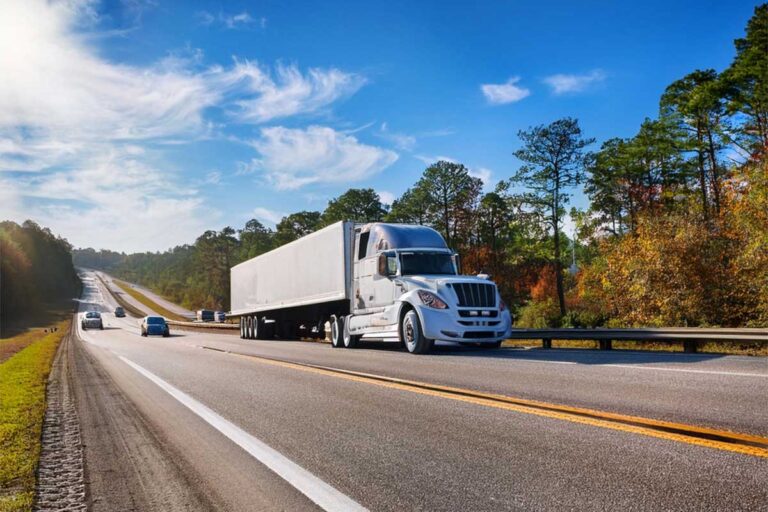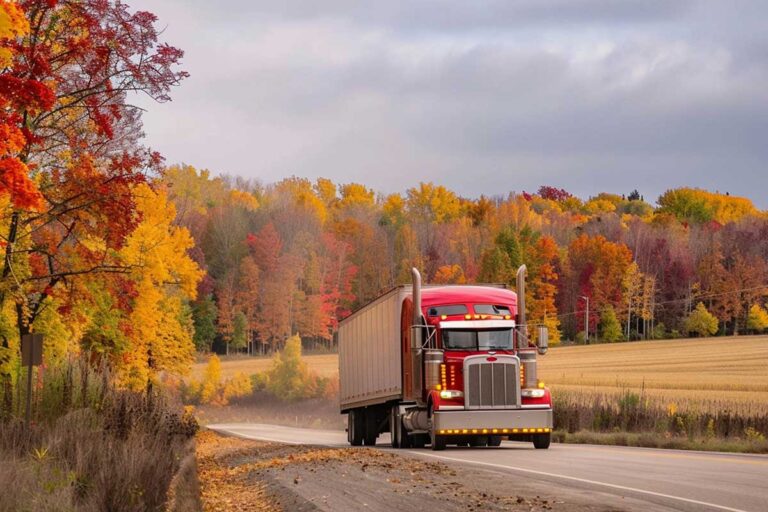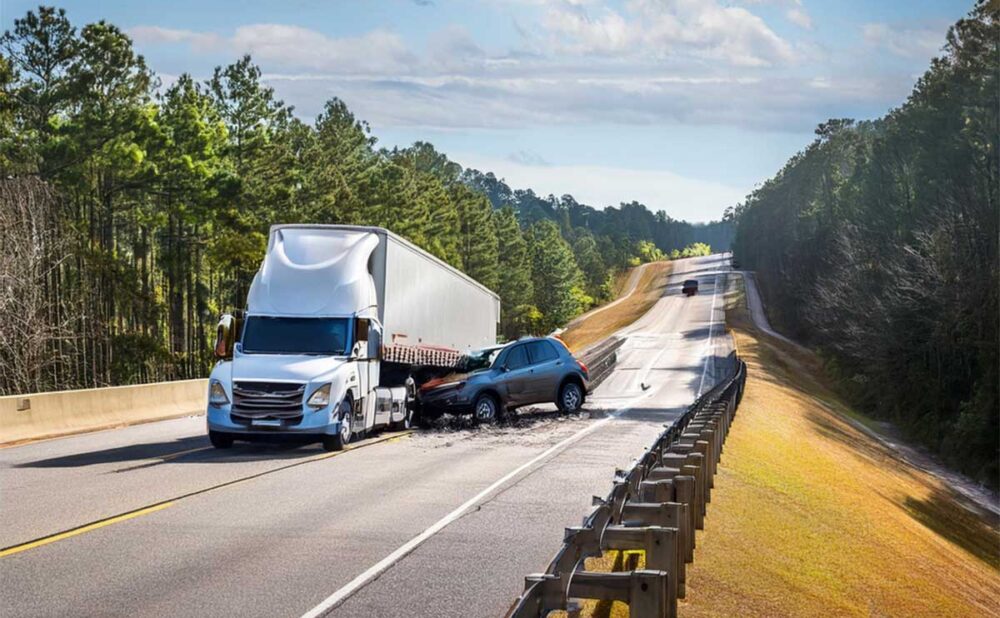How Do Truck Accidents Differ from Car Accidents?
Truck accidents are distinct from car accidents in several significant aspects. The difference in size and weight between the two types of vehicles often results in more severe injuries for car occupants compared to those in the larger truck. Statistics indicate that occupants of passenger cars are at a higher risk of sustaining fatal injuries, with a rate of 68%, whereas the rate for truck occupants is considerably lower at 15%.
Moreover, the majority of car accidents are typically attributed to driver error. Conversely, truck accidents may arise from a variety of factors, including driver mistakes, mechanical failures, manufacturing defects, and issues related to improperly loaded cargo. These complexities can complicate the process of determining liability in truck accidents, making it essential to seek legal assistance for proper guidance and support.
The Impact of Size and Weight on Truck and Vehicle Collisions
The principles of physics primarily explain the greater severity of truck accidents compared to passenger vehicle collisions. Research conducted by the Insurance Institute for Highway Safety (IIHS) indicates that a truck can weigh up to 30 times more than a standard passenger vehicle. A tractor-trailer can weigh as much as 80,000 pounds, whereas the majority of passenger vehicles typically weigh under 4,000 pounds. This significant difference in size, weight, and height during a collision can result in several serious consequences:
- The passenger car may become trapped beneath the truck.
- The truck may require as much as 40% more distance to come to a complete stop.
- Occupants of the passenger vehicle find themselves in a precarious situation.
This substantial difference in weight results in a truck exerting significantly more force upon impact than even the heaviest passenger vehicle can endure. Consequently, 97% of fatalities in fatal truck accidents involve occupants of passenger vehicles.
A semi-truck or large rig has the potential to completely crush a smaller vehicle. Additionally, their greater dimensions heighten the risk of underride accidents, which are among the most catastrophic types of truck collisions. In such incidents, the smaller vehicle may become lodged beneath the truck or have its roof entirely sheared off. In any truck-related accident, the likelihood of severe property damage, serious injury, and fatalities is considerably greater than in a collision involving only passenger vehicles.
If you or a loved one has sustained severe injuries, or if a family member has tragically lost their life in a truck-related accident, determining the responsible party and seeking accountability can be a daunting task.
Engaging an Atlanta truck accident attorney can provide essential guidance in constructing your case and assist you in pursuing compensation for your injuries and associated costs.
Injured In A Truck Accident? Contact Us For A Free Consultation
Injured In A Truck Accident?

The Difference Between a Semi Truck Accident and a Car Accident
There are several key differences between truck accidents and car accidents, particularly regarding the severity of injuries sustained by victims and the number of individuals involved in the incidents. These distinctions can play a crucial role when pursuing a lawsuit or filing a personal injury claim. Additionally, the type of vehicle involved is a critical element in determining liability for injuries sustained in a motor vehicle accident caused by another driver.
The substantial size and weight of a truck colliding with a car can result in injuries that may persist for years and significantly affect the victim’s quality of life. If a smaller vehicle is involved in the accident, the injuries may be less severe, and the person inside may have a greater likelihood of a complete recovery.
Lack of Visibility and Immediate Stopping Capability
Trucks inherently face greater challenges in observing the road and surrounding vehicles compared to standard passenger cars, making limited visibility a primary factor in trucking accidents. For instance, 18-wheelers possess extensive blind spots that can obscure the presence of other vehicles. Entire cars can easily occupy these blind spots, increasing the risk when the truck changes lanes or makes a turn.
When a truck driver is unable to detect a car, the consequences can be severe, often resulting in the car being crushed or forced off the road. In contrast, if a car driver fails to notice another passenger vehicle, the resulting damage is typically less severe.
Another significant factor contributing to serious truck accidents is the vehicle’s stopping capability. Sudden hazards compromise truck drivers’ ability to react, even when they are aware of them. Due to the size and weight of trucks, they require 20% to 40% more distance to come to a complete stop. Consequently, collisions involving trucks often occur at much higher speeds than those involving smaller vehicles. The combination of increased speed and mass can lead to catastrophic injuries.
Rollover Accidents and Jackknifing
According to the National Highway Traffic Safety Administration (NHTSA), approximately 85% of fatalities resulting from rollover incidents involve single vehicles. Conversely, 15% of accidents that include two or more vehicles tend to be particularly severe, often resulting in serious injuries or fatalities for those involved.
The weight, size, and shape of a vehicle influence the likelihood of a rollover accident. Commercial tractor-trailers, box vans, SUVs, passenger vans, and pickup trucks are more susceptible to rollovers due to their elevated centers of gravity.
Jackknifing occurs when a truck driver suddenly applies the brakes, particularly at high speeds. This abrupt action can cause the truck and its trailer to skid, potentially leading to a jackknife situation.
Heavy trucks often cause fatal collisions with passenger vehicles due to the significant differences in size, weight, and height. Additionally, factors such as wet or slick road conditions, inadequate brake maintenance, or a fully loaded trailer can extend the stopping distance of a tractor-trailer by twenty to forty percent compared to that of a passenger car.
Need a Free Consultation? Need a Skilled Attorney?
Free Consultation
Call (770) 771-5130
If you’ve been injured, you need to hire the best legal care to assist you with your claim. Get a FREE consultation today!
Understanding Federal Trucking Regulations
The government regulates the investigation of truck accidents and determination of liability in the trucking industry through a comprehensive set of laws and regulations. Additionally, trucking companies frequently mount a strong defense against claims to reduce the compensation owed to victims of truck accidents.
All road users are ensured safety through the establishment of federal trucking regulations. These regulations specify various requirements, including vehicle dimensions and the maximum driving hours permitted for truck operators.
The Federal Motor Carrier Safety Administration sets forth the laws and regulations that trucking companies must follow. Noncompliance with these regulations may result in the company being held liable for:
- Inadequately trained truck drivers
- Negligently employed drivers
- Drivers lacking supervision
- Drivers experiencing fatigue
- Breaches of safety standards
Regulations encompass various areas, including hours of service, drug and alcohol testing, hazardous materials handling, and Department of Transportation medical examinations. Compliance necessitates maintaining essential documents and certificates, conducting daily truck inspections, ensuring driver qualifications, monitoring vehicle weight, establishing realistic delivery timelines, and adhering to designated truck routes.
The likelihood of severe accidents involving trucks and other vehicles significantly increases when truck drivers, trucking companies, and associated parties neglect specific federal regulations.
Given these complexities, it is essential for individuals injured in large truck accidents to seek exceptional legal representation. At The Jewkes Law Firm, we dedicate ourselves to providing superior advocacy for injured clients across Georgia. Our attorneys specializing in big rig accidents in Atlanta are adept at investigating incidents, identifying liable parties, and ensuring they are held accountable.
Investigating Accidents Involving Large Trucks and Tractor-Trailers
A prompt and comprehensive investigation is essential for the success of your case. Following an accident, trucking companies quickly deploy a team of specialists to the site to gather evidence and formulate a legal strategy.
Nevertheless, a proficient attorney from our firm can take proactive measures to counteract these efforts:
- Visiting the accident site to capture photographs of all relevant evidence
- Identifying and interviewing witnesses
- Recording the existing road and weather conditions
- Collecting documentation such as meal and fuel receipts, which may help establish speed
- Acquiring cell phone and other records to demonstrate negligence
- Issuing a preservation of evidence letter and securing a temporary restraining order
The earlier you consult with an attorney, the sooner they can initiate their investigation to safeguard vital evidence. During a lawsuit, the legal discovery process becomes just as important for determining the case’s outcome. During this phase, your attorney may request evidence and information from the opposing party and directly interrogate the truck driver. For instance, a seasoned lawyer understands how to examine a driver’s records to obtain insights into their training, employment background, and history of accidents.

GEORGIA PERSONAL INJURY LAWYER NEAR ME

How Truck Accidents and Car Accidents Differ
The complexities of the recovery process make truck accidents differ from car accidents. The three main distinctions are:
- Financial Liability
- Driver Accountability and Federal Regulations
- Severity of Injuries
Truck vs Car Accident: Assessing Injury Risk
The substantial mass and extended stopping distance of trucks result in a more severe impact on cars during collisions. When a truck and a car collide, the force experienced by the car is considerably greater due to its ability to come to a complete stop in a shorter time frame, leading to increased G forces within the vehicle.
The initial impact in accidents involving trucks and cars inflicts significantly more harm on the occupants of the car. This is one of the primary reasons why commercial drivers are required to obtain a Commercial Driver’s License (CDL). Truck drivers are required to adhere to high driving standards and are knowledgeable about the pertinent safety regulations and concerns associated with their profession.
Nevertheless, there are distinct scenarios where the truck driver may also sustain serious injuries, particularly if the truck jackknifes, rolls over, or experiences another incident following the initial collision.
Commonly Reported Injuries from Truck Accidents
A notable characteristic of serious truck accidents is the extent of injuries sustained by those involved. While car accidents can also result in significant injuries, truck accidents almost invariably lead to more severe outcomes. The significant size difference between trucks and passenger vehicles often results in more severe injuries for those in smaller vehicles. The types of injuries frequently associated with truck accidents include:
- Internal injuries
- Internal bleeding
- Limb amputations
- Soft tissue injuries
- Head and neck injuries
- Chemical and contact burns
- Back and spinal cord injuries
- Traumatic brain injuries (TBIs)
Less severe injuries may include cuts, scrapes, bruises, and fractures. When injuries are serious or compounded, they may necessitate extensive and expensive medical treatment. Additionally, such injuries can lead to disfigurement requiring surgical intervention and various other treatment modalities, or they may result in serious infections.
Injuries resulting from truck accidents are frequently classified as catastrophic. From both legal and medical perspectives, a catastrophic injury is one that fundamentally alters an individual’s life. Such injuries necessitate extensive medical treatment and often result in long-term consequences that survivors must navigate. In addition to the medical challenges, these injuries impose a financial burden due to high medical costs and the potential loss of the individual’s ability to work as they previously did.
In summary, claims arising from truck accidents tend to result in substantially larger settlement amounts, given their more devastating impact on the health and property of those affected.

Determining and Establishing Negligence
In a typical automobile accident, identifying the party responsible for financial compensation is generally straightforward. However, this is not the case with commercial truck accidents, where multiple potential defendants and a complex network of liability often exist. Gaining insight into these factors can clarify how truck accidents differ from car accidents.
The insurance dynamics in truck accidents also diverge significantly from those in standard car accidents. Insurers are not required to disclose the extent of trucking companies’ insurance coverage until litigation begins. However, trucking companies are mandated to maintain such coverage. An additional distinctive feature of commercial truck insurance is the MSC90 endorsement, which mandates that insurance companies provide coverage for vehicles not explicitly listed on a policy. While these legal complexities may appear daunting to the average individual, they are commonplace for attorneys specializing in truck accidents. Should you have any inquiries, the Jewkes Law Firm is available to assist you. For a complimentary consultation, please reach out to us at (770) 771-5130.
Regardless of the specific circumstances surrounding the accident, truck drivers are accountable for any damage caused by their vehicle, their driving behavior, or their mental state. Additionally, trucking companies may be held liable for accidents involving their drivers, as they are responsible for hiring competent drivers and adhering to federal safety standards. When these standards are not met, it is ordinary individuals who suffer the consequences, sometimes with devastating effects on their health and lives.
Potential Responsible Parties in Truck Accidents
In most of vehicular accidents, driver negligence is the leading factor, enabling you to seek compensation from the responsible driver or their insurance provider. However, truck accidents may involve one or more responsible parties, which can complicate your case. It is essential to identify all liable parties and appropriately distribute the responsibility.
This may require pursuing claims against several insurance entities at once, which entails:
- Completing and submitting multiple claim forms
- Assembling more than one set of evidence
- Engaging in various settlement discussions
A truck accident attorney can assist you in navigating the complexities of your situation and ensure that each responsible party is held accountable for their actions. Potential defendants in a truck accident claim may include:
- The truck driver or their employer
- The manufacturer of a faulty component
- The retailer of the truck
- The facility responsible for loading
- The repair shop
- The governmental body in charge of road maintenance
The Truck Driver
There are instances where the conduct and actions of a truck driver may lead to an accident. Such situations may arise when the driver is:
- Distracted
- Fatigued
- Under the influence of alcohol or drugs
- Exceeding the speed limit
Additionally, the truck driver can be held responsible if he falsifies his logbook or surpasses the legally permitted driving hours.
An attorney managing your case can assist you in acquiring copies of the driver’s logbook, driving history, blood alcohol concentration (BAC) test results, and other pertinent evidence that substantiates his actions and financial responsibility.
The Trucking Company
While the truck driver bears responsibility for his conduct, the trucking company is accountable for the vehicle, its upkeep, and various elements that may have played a role in the incident. These factors may encompass:
- Deficient vehicle inspections
- Incorrectly loaded cargo
- Insufficiently trained drivers
- Inadequate driver training
- Neglected truck maintenance
Your attorney has the authority to request relevant documentation—such as truck maintenance logs, evidence of driver training or the absence thereof, and footage of the cargo loading process—that substantiates your case against the trucking company.
Truck and Component Manufacturers
A truck is a large vehicle composed of numerous parts and components. Consequently, if a manufacturing or design defect leads to a malfunction, you may have grounds for a case against the truck’s manufacturer.
In addition, you may also hold accountable one or more companies responsible for producing the truck’s components. This could involve defective windshield wipers that hindered visibility or malfunctioning brakes that prevented the driver from stopping, despite their best efforts.
Your attorney can acquire mechanical assessments and engage expert witnesses to demonstrate that a defective part played a role in the accident.

GEORGIA PERSONAL INJURY LAWYER NEAR ME
Reach Out to The Jewkes Firm Today for a Free Review of Your Truck Accident Case
It has been established that truck accidents differ significantly from car accidents. Therefore, it is prudent to engage an attorney with specialized experience in handling trucking accident claims. Trucking companies and other responsible parties are held accountable for the most severe collisions on Atlanta’s highways by the Jewkes Law Firm, which is recognized as a leader in truck accident litigation. Our attorneys have the expertise to navigate truck accident cases and are equipped with the necessary resources, personnel, and commitment to pursue optimal outcomes consistently. Regardless of the circumstances, we dedicate ourselves to achieving the best results.
If you or a loved one has suffered serious or fatal injuries in an accident involving a large truck, you may be eligible for financial compensation. At The Jewkes Law Firm, our truck accident attorneys will clarify the distinctions between your truck accident case and a typical car accident case. We will also explain how we will build your case for financial recovery.
Get in touch with our law firm today at (770) 771-5130 to discover more about our commitment to advocating for your rights.





